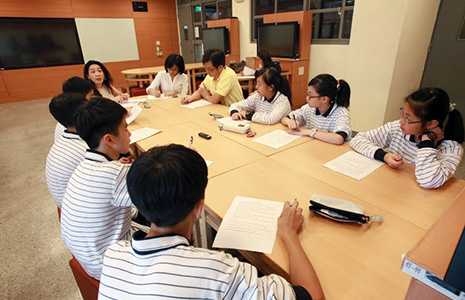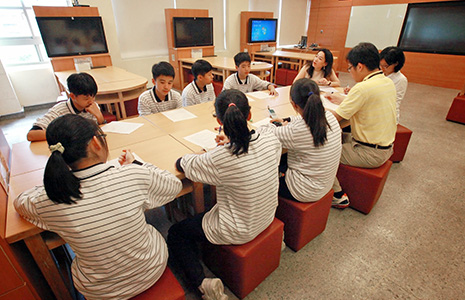| |
| |
|
|
|
|
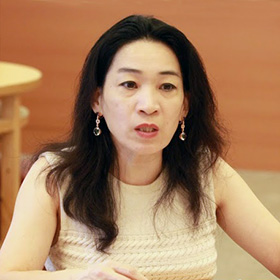 |
|
| |
Yu-hua Li
General contractor for hotel renovations
Charity work
Experiences
- President of PTA, Taipei Municipal Lihu Elementary School
- President, PTA Union
- Standing Committee Member, Kang Chiao Bilingual School
Currently
- Vice President of PTA, Affiliated Senior High School of National Taiwan Normal University
- Standing Committee Member of PTA, Taipei Fuhsing Private School
- President, Taipei City PTA Association
|
|
| |
|
|
| |
| School Lunch Committee |
(Wei-tse) |
Member, Taipei Fuhsing Private School Lunch Committee
Location: Campus of Taipei Fuhsing Private School
Time: November 11, 2014
Introduction
Food safety is an issue concerned by the public. To find out the food safety monitoring and management in school, we interviewed the member of the School Lunch Committee. Our interview questions included the responsibilities and duties of the committee, the procedures of food safety inspection, and the decision-making on the menu which should consider both health and taste, the selection of safe ingredients including meat, vegetables, and fruits. We also want to know how organic and toxic-free ingredients are selected. The transportation of ingredients may affect the freshness and diversity of foods, so we want to talk about this as well. Finally, we want to know how the school utilizes effective means to advocate correct food safety concept for teachers, students, and parents.
Q1. What are the responsibilities of School Lunch Committee members? What is the most important responsibility? (Jie-sheng)
A1. I have been serving at this position since my son entered elementary school. The committee members need to evaluate and select suppliers, and attend related meetings. We need to make sure that the supplier knows the school requirements, and the food is just one of the elements. We also need to know about the ingredients, and check whether the cooking method is suitable for the students of different ages, such as low-salt and low-oil, as well as whether enough calorie is provided. The most important thing is the sanitation of kitchen. We need to know the working process of the suppliers, and determine the key points to be monitored. We make a checklist for the ingredients, food supply, purchasing content, cleanliness of tableware, and staff’s sanitation. Then, we check the environmental sanitation regularly, because the food waste produced everyday, the classification, cleaning, and transportation may affect the sanitation of kitchen. We also check how the dry goods and oil are stored, whether they are expired. The most important work is to ensure students’ meal quality.
Q2. Do you have certain standard procedure while you check food making process and food suppliers? (Tsai-chen)
A2. There is SOP for food making process and food suppliers of school. First, the committee and the school together determine a healthy menu, and then purchase the ingredients from suppliers. There is more than one supplier for each kind of ingredient in order to avoid supply shortage due to short stock or natural disaster, so 2-3 suppliers for each kind of ingredient. We then confirm the sourceof ingrediants (the suppliers need to provide certification) and ensure no shortage of ingrediants. Each ingrediant in the kitchen has different SOP.
Q3. Do you participate in determining the menu? What are your requirements for daily menu? How will you improve the menu if not favored by the students? (Hui-yu)
A3. Yes. The menu should meet three conditions: healthy, safe, and acceptable. We have different menus for different grades, and the menu changes every month.
Q4. What are your requirements for the suppliers? Are the suppliers required to provide qualification? What certifications do they need to provide? (Tsung-chun)
A4. As for the ingredients provided by the suppliers, in case of meat, they need to provide CAS certificate; in case of vegetables, they need to provide non-pesticide report or organic vegetable certificate.
Q5. Does the school require that the ingrediants supplied must be local and toxic-free? If so, how does the school monitor the quality? If not, is the school willing to make efforts in this regard? (Wei-tse)
A5. We ask the school to use local vegetables and fruits as much as possible. In terms of toxic-free vegetables, we have paid special attention and supervised whether the ingrediants have passed toxic-free inspection. We check the kitchen regularly and oversee the washing process of vegetables, in order to ensure no residue of pesticide. When we heard about the adulterated food on the media, we would check with the kitchen on whether the adulterated food is used.
Q6. What are the standards for fruit selection? Does the school buy from farmers or wholesalers? (Yin-cheng)
A6. The volunteer moms of each class are scheduled to check the kitchen regularly, and the fruits are one of the inspection item. We ask the suppliers to provide toxic-free certificate and send fresh fruits in boxes to the school directly. We check the look, quality, and freshness of the fruits. The fruits are all purchased from wholesalers of Sanchong Vegetables & Fruits Market or Binjiang Market. It is better to buy from wholesalers because they can provide more varieties of fruits, because local farmers cannot provide different types of fruits. We are very confident in the quality of fruits that we purchase.
Q7. When selecting fruits, do you require the certification of organic or toxic-free fruits? (Wei-tse)
A7. This is an objective we are pursuing. The ngrediants must pass toxic-free inspection. However, due to insufficient funding, we can only provide organic vegetables once a week. In the future, we hope we can increase the number of days providing organic vegetables and fruits.
| |
|
|
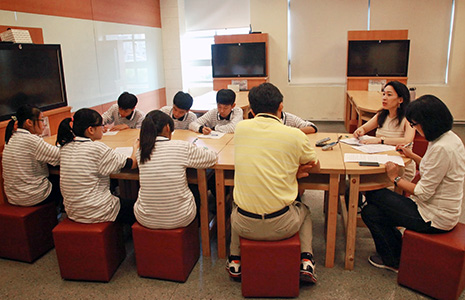 |
|
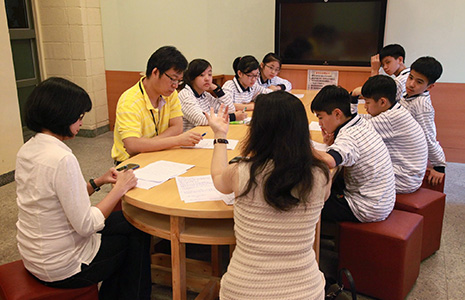 |
| |
|
|
Q8. What is the process for cleaning fruits in school kitchen? How do you know that the pesticide on fruits has been removed? (Yin-cheng)
A8. The cleaning process of school kitchen is to continuously wash fruits with flowing water to carry away pesticide residue or dirt on fruits. It is rather unclean to wash fruits in a barrel. Furthermore, we require the kitchen staff to check whether the fruits are rotten or damaged before cleaning. The fruit knife and cutting board should be kept clean during cutting. Sanitation is always number one. Currently, we can only use flowing water to wash the vegetables and fruits, and no cleaning standard to judge whether the pesticide residue on fruits has been completely removed. If allowed, we hope that we can obtain cleaning standard of fruits, such as how long the washing should be for different kinds of fruits, and which way can be used to completely remove pesticide. This is our future objective!
Q9. The food safety education of school is completely undertaken by the suppliers, which is not effective at all. What is your suggestion on providing food safety education in school? (Hui-yu)
A9. Currently, the suppliers mention food safety only when they provide organic vegetables. We will try our best to educate students with posters about good food and organic vegetables & fruits. In the parents’ reading club, we educate the volunteer moms about food safety, so that both parents and students are aware of the food they eat, and ask the kitchen to provide good food.
Q10. Currently, the food safety problem is very serious in Taiwan, and how will the committee face this problem? (Tsung-chun)
A10. The food safety problem is a public concern, not just a problem concerned by the school. Taiwan is the kingdom of gourmet food. In the past, we only require that the food is delicious, but the food safety problem has become an important issue. What the committee can do is limited, such as checking the brand of cooking oil, and imported ingredients. In the past, we trusted well-known brands; now, we all need to pay attention to food safety. If the adulterated oil is seen in school, the students and parents should report to relevant personnel. Food safety is not the responsibility of the committee, but all students and parents. As for me, I engage in PTA union so that I deal with more than 100 schools. If I know that there is any adulterated food, I would check the school kitchen immediately. If it is used, it should be replaced. We choose reliable and honest suppliers. To sum up, food safety depends on everyone!
Conclusion
From the interview, we learned that the committee undertakes major responsibilities, and they need to monitor the use of salt and oil, food calorie, kitchen sanitation, management of ingrediants, tableware cleaning, staffs’ sanitation, and even food waste. Second, the committee works with the school to develop a healthy menu. The suppliers then provide certified ingrediants. The menu must meet the requirements of health, safety, and level of acceptance. As for requirements of ingrediants, the meat must be provided with CAS certificate, and the vegetables must be provided with non-pesticide or organic vegetable certificate. Local vegetables and fruits should be used as much as possible. The committee members check the washing process to ensure no pesticide residue. Currently, the suppliers provide organic vegetable once a week. In terms of selection of fruits, besides have non-pesticide certificate, the fruits should look complete, are of good quality and fresh. When cutting the fruits, the fruit knife and cutting board should be kept clean. For diversity, the fruits are purchased from wholesalers. Third, it is food safety education. Posters are used to educate students about food safety problem. The parents’ reading club is another channel to inform parents of food safety. The committee strives to safeguard the quality of the food for the students.
| |
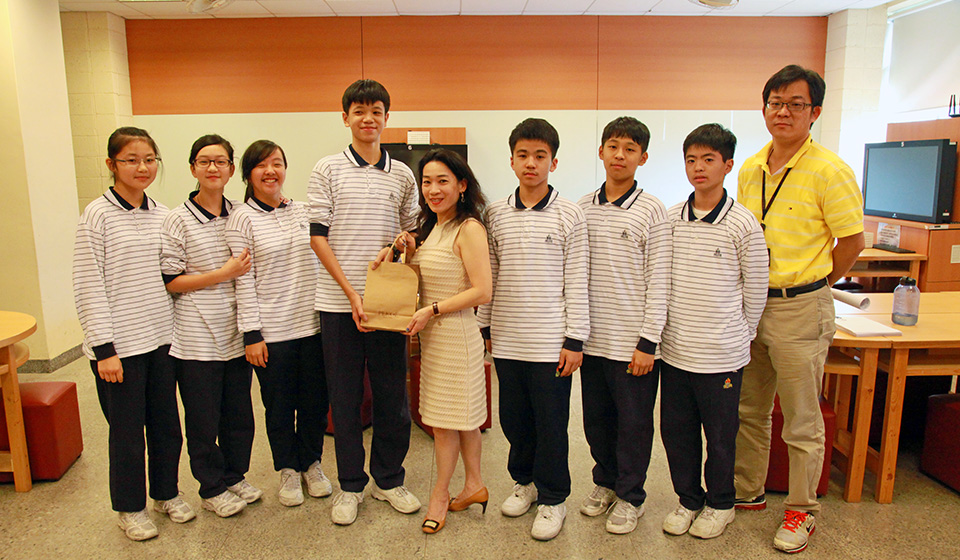 |
|







